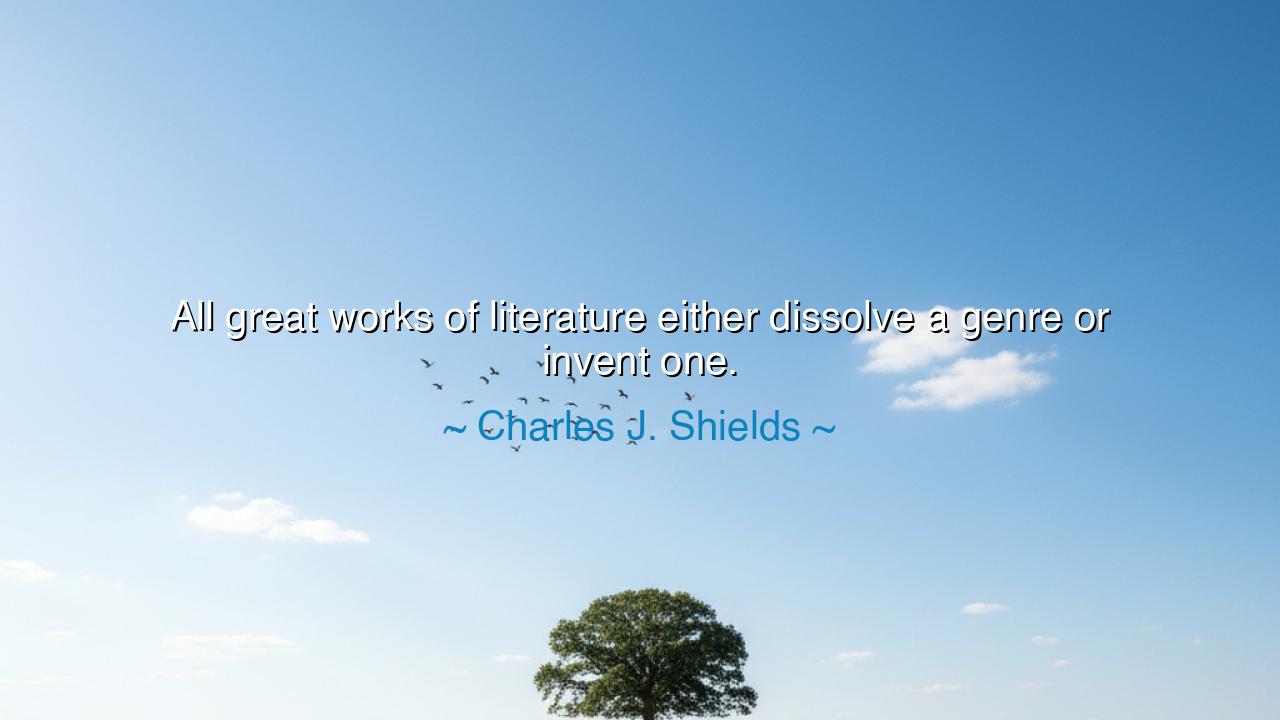
All great works of literature either dissolve a genre or invent






When Charles J. Shields declared, “All great works of literature either dissolve a genre or invent one,” he unveiled a truth that reaches beyond the written page — a truth about creation, transformation, and the eternal evolution of art. His words remind us that greatness does not dwell in imitation, but in rebirth. Every truly great work, whether written, painted, or sung, breaks the boundaries of what came before. It does not simply follow form; it transcends it. The ancients would have said that all creation is an act of divine rebellion — that the artist, like Prometheus, steals fire from the gods not to worship the old flame, but to kindle a new one.
The origin of Shields’ reflection lies in his study of the masters — writers who, in their daring, transformed literature itself. When he says that great works “dissolve a genre or invent one,” he points to a sacred paradox: that the highest form of creation often destroys what it loves. A genre is a vessel — a pattern, a convention, a boundary of expectation. To dissolve it is to stretch it until it breaks, to reveal that the human spirit cannot be confined to old forms. To invent one is to give birth to a new vessel, molded by fresh vision, filled with new emotion and truth. The great artist, then, is not a follower of form, but a creator of worlds, where old laws yield to new possibilities.
Consider the example of Homer, the father of Western literature. Before him, there were tales of heroes, yes — but no epic in the true sense. It was through the Iliad and the Odyssey that Homer gave shape to the human journey itself: the struggle of man against fate, the yearning for home, the moral testing of the soul. In doing so, he invented a genre — the heroic epic — that became the foundation of storytelling for millennia. And yet, even as later poets followed him, none could confine his spirit within that genre. His work dissolved its own form, transcending its structure to speak not only of heroes, but of humanity itself.
Centuries later, Shakespeare would do the same. In his tragedies, comedies, and histories, he bent the rules of theater until they became something greater than performance — they became mirrors of the human condition. His Hamlet is not simply a tragedy; it is philosophy clothed in verse. His A Midsummer Night’s Dream is not mere comedy; it is dream and reality intertwined. In this way, Shakespeare’s art did both: it dissolved the rigid forms of his time and invented something vast and enduring — the modern understanding of character, of inner conflict, of the mind’s theater. He proved that the artist’s role is not to repeat, but to reimagine.
In more recent times, we see this same spirit in Virginia Woolf and James Joyce, whose stream-of-consciousness writing dissolved the novel as it was known. The straight road of narrative gave way to the labyrinth of thought, where time and memory flowed like rivers through the mind. And in Toni Morrison, we witness a fusion of myth, memory, and history — not bound by genre, but transcending it. Each of these artists, in their time, obeyed the same law that Shields describes: they dared to reach beyond form, not out of arrogance, but out of truth. For truth itself does not live in structure; it lives in vision.
And this law, though spoken of literature, applies to all forms of creation — to music, to science, to life itself. The innovators who change the world — Beethoven, who shattered the symphonic order; Einstein, who rewrote the laws of physics; Gandhi, who turned resistance into moral revolution — all are guided by this same principle. They inherit what came before, but they refuse to be confined by it. They dissolve the old and create the new, not by destroying meaning, but by expanding it. For creation, in its purest form, is the act of giving the world something it did not yet know it needed.
So, my listener, learn from this: do not fear the boundaries that surround you — but neither should you worship them. Study the forms of your craft, master the rules — and then, when the moment comes, break them with wisdom. True greatness lies not in perfection, but in transformation. When you create — whether with pen, or voice, or deed — ask yourself not, “Does this fit the mold?” but rather, “Does this breathe?” For art that breathes will outlive its form, just as the soul outlives the body.
And finally, remember this: every act of originality is an act of courage. To dissolve a genre is to risk misunderstanding; to invent one is to stand alone. Yet the fire of creation burns brightest in those who dare. Follow that flame within you. Let your work be both a tribute and a rebellion. For as Charles J. Shields reminds us, the great works are not those that follow — they are those that begin anew, and in doing so, teach the world to see itself again.






AAdministratorAdministrator
Welcome, honored guests. Please leave a comment, we will respond soon